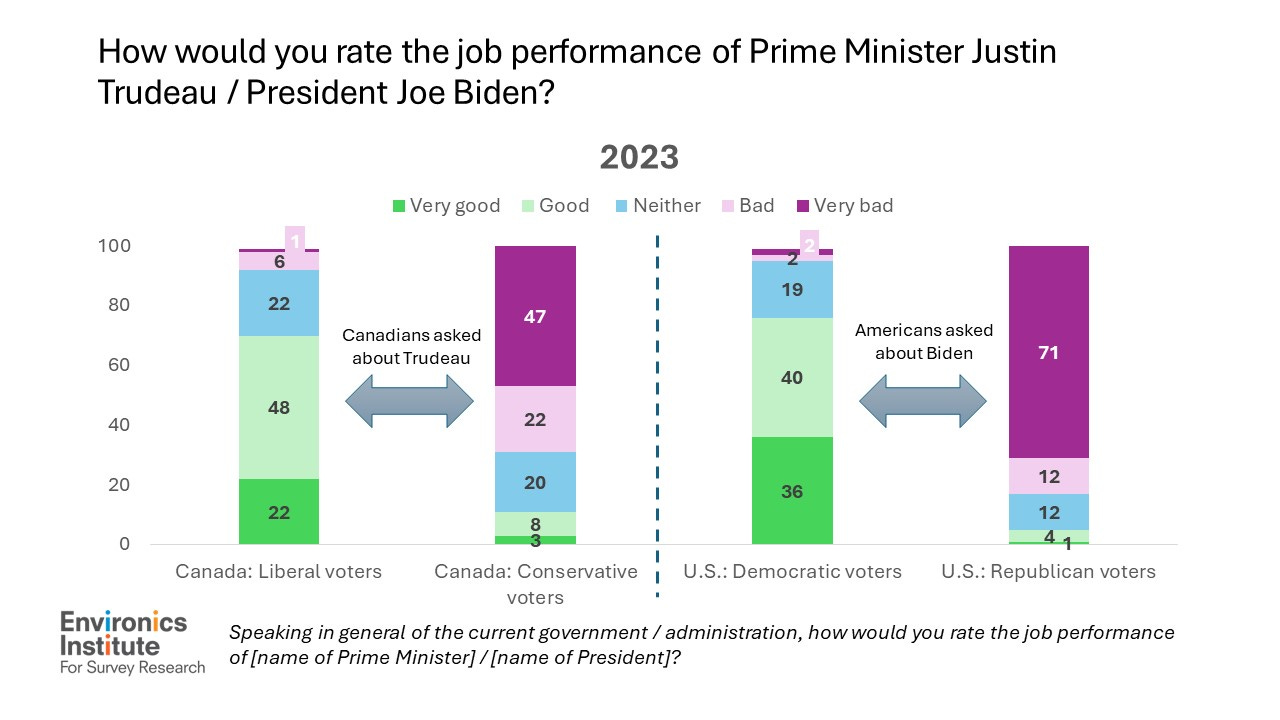Rating Trump and Trudeau: Partisan divides in Canada and the U.S.
Are Canadians getting closer to the American extremes of political polarization?
Just how polarized (or whacky?) is politics in the United States these days? And how close are Canadians getting to going down the same path?
These are familiar questions, but here’s a new way to explore them: we can look at how the supporters of opposing political parties in each country assess the job performance of the current president or prime minister.
Our first results are from 2014, when Canadians were asked about Stephen Harper, and Americans were asked about Barack Obama. No surprise: a majority of Canadian Conservatives said Harper was doing a good job, while a majority of U.S. Democrats said the same about Obama.
There is nothing dysfunctional in a democracy about people cheering on their own team and disliking their opponents. But the intensity of negative feelings in the U.S. is jarring. It’s not just that 85 percent of Republican supporters thought that Obama was doing a bad job, it’s that most of those (67%) rated the Democratic president as very bad. This compares to only 18 percent of Canadian Liberal Party supporters who had the same very negative opinion about Harper.
When we jump ahead to 2019, the leaders have switched. Americans were asked about Donald Trump, while Canadians were rating Justin Trudeau. The responses from U.S. Democratic supporters mirrored those previously given by Republicans about Obama: 82 percent of Democrats thought that Trump was doing a bad job, including 69 percent who rated him as very bad.
Conservative Party supporters in Canada were hardly fond of Trudeau, but only two in five went as far as saying the Liberal prime minister was doing a very bad job.
Just as interesting, though, is the contrast between Canadian Liberal Party supporters and U.S. Republicans. Sure, in 2019, a majority of Liberal Party supporters in Canada said that Trudeau was doing a good job, but only 21 percent thought that he was very good. The proportion of U.S. Republican supporters who gave this top rating to Trump was three times as high (63%). U.S. politics at that time was obviously more polarized, in the most literal of senses: majorities of supporters of each of the two parties held polar opposite views – something that was not the case in Canada.
Where do things stand today? Biden has replaced Trump as president, and so the views of Republicans have predictably reverted to where they were under Obama: 83 percent say that Biden is doing a bad job, including 71 percent who rate his performance as very bad. The views of U.S. Democratic Party supporters about Biden are mostly positive and similar to what they were in 2014 (when asked about Obama) – although much less extreme than the ultra-positive feelings that Republicans had about Trump when he was president.
Canadian Conservatives feel more negatively about Trudeau in 2023 than they did in 2019 – while their overall “bad” rating is unchanged, their “very bad” assessment has increased – but are still less one-sided than their U.S. Republican counterparts.
Representative democracy is fuelled by the contrasting platforms of leaders and parties. Supporters of one party or candidate are under no obligation to like their political opponents. But the worry is that, if feelings get too intense, citizens will have trouble reconciling themselves with the outcomes of the elections that their party loses (as we discussed the other day on Pénélope on Radio-Canada). This is what Tony Keller was writing about this week, in his Globe and Mail column reflecting on Brian Mulroney’s political era. Keller asked: “In the era of social-media non-conversations, and us-versus-them polarization, are politicians still willing to lower the temperature – on their own side – instead of raising it?”
It’s hard to imagine the winner of the upcoming U.S. presidential election eliciting less intense feelings on either side. It’s also impossible to know whether negative feelings about Trudeau among Canadian Conservative Party supporters have peaked, or to anticipate how Liberal Party supporters might eventually end up feeling about the next Conservative to serve as prime minister. All we can say is that, for the moment, there continues to be a more middle ground in Canadian politics than there is in the democracy to the south.
The findings featured in this post are from the Canadian portion of the 2023 AmericasBarometer. The AmericasBarometer is a biennial comparative survey of democratic values and behaviours that covers countries in North, Central and South America, as well as a significant number of countries in the Caribbean (the 2023 survey covers 25 countries). The project is led by the Latin American Public Opinion Project (LAPOP) at Vanderbilt University.
The survey is the most comprehensive source of information about support for democracy in Canada. Follow the Environics Institute to catch more reports from this survey.
The 2023 AmericasBarometer in Canada survey was conducted by the Environics Institute for Survey Research, in partnership with LAPOP at Vanderbilt University. It was conducted online with a representative sample of 2,500 Canadians (aged 18 and over) between July 20 and August 4, 2023. The author is solely responsible for any errors of presentation or interpretation.
AmericasBarometer data for the United States were supplied by the Latin American Public Opinion Project at Vanderbilt University, which takes no responsibility for any interpretation of the data. The 2023 survey in the U.S. was conducted online with a representative sample of 1,500 Americans (aged 18 and over) between July 21 and July 26, 2023.
What is the Environics Institute for Survey Research? Find out by clicking here.
Follow us on other platforms:
· Twitter: @Environics_Inst or @parkinac
· Instagram and Threads: environics.institute







